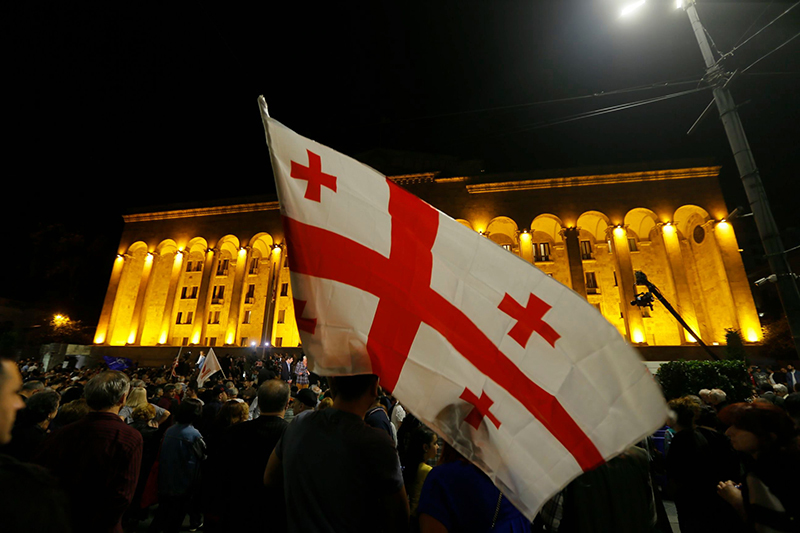W Kongresie trwają prace nad przyjęciem ustawy „Georgia Support Act”, powołującej do życia dodatkowe mechanizmy wsparcia dla władz w Tbilisi. W treści proponowanego dokumentu stwierdza się potrzebę podejmowania przez Waszyngton różnorakich działań, w tym także wprowadzenia sankcji w odniesieniu do podmiotów, naruszających prawa człowieka na okupowanych terytoriach Gruzji.
„Georgia Support Act” po raz pierwszy została przedstawiona amerykańskiemu Kongresowi jeszcze na początku bieżącego roku, zaś obecnie – w drugiej połowie października – została przyjęta przez pełen skład Izby Reprezentantów, przy bipartyjnym poparciu. Pomimo, że to jeszcze nie koniec procesu legislacyjnego, fakt ten został przyjęty z ogromnym entuzjazmem w samej Gruzji, zwłaszcza, że jest to sytuacja bez precedensu w historii współpracy pomiędzy oboma państwami. Co zatem dokładnie zakłada treść proponowanej ustawy i czy faktycznie będzie ona mogła wpływać na sytuację na Kaukazie Południowym?
Wsparcie gruzińskiego bezpieczeństwa
Po pierwsze, autorzy „Georgia Support Act” jednoznacznie stwierdzają potrzebę zapewnienia nawet wyższych niż dotychczas (łącznie 37 mln USD w 2018 r.) nakładów finansowych na rzecz wsparcia gruzińskiego bezpieczeństwa militarnego, odnotowując zarówno zaangażowanie Gruzji w integrację z NATO, jak i jej zaangażowanie w misje w Afganistanie i Iraku. Co przy tym istotne, na mocy ustawy, o ile zostanie ona rzeczywiście przyjęta w obecnym brzmieniu, sekretarz stanu USA ma w ciągu pół roku przedstawić raport, zawierający m.in. 5-letnią perspektywę dla możliwości wsparcia gruzińskiego potencjału obronnego przez Waszyngton.
Ponadto, niezależnie od kwestii związanych z tzw. „twardym” bezpieczeństwem, „Georgia Support Act” odnosi się także do nowych zagrożeń z zakresu cyberbezpieczeństwa i dezinformacji. Jest to przy tym o tyle istotne, o ile w obu tych obszarach Gruzini doświadczyli już rosyjskiej aktywności. Federacja Rosyjska od lat wykorzystuje bowiem całą siatkę mediów, NGO, publicystów czy polityków do tego, by wspierać w Gruzji anty-zachodnie nastroje i chociażby dyskredytować sens gruzińskiej integracji z NATO. Z kolei w odniesieniu do cyberbezpieczeństwa wystarczy wspomnieć, że to właśnie wojna 5-dniowa w sierpniu 2008 roku jest uznawana za jeden z pierwszych tak wyraźnych przypadków agresji cybernetycznej w ramach działań wojennych.
W stronę strefy wolnego handlu?
Drugą kwestią, która jest szeroko komentowana przez zainteresowanych gruzińską polityką pozostaje odwołanie się autorów „Georgia Support Act” do kwestii liberalizacji handlowej Gruzja-USA. W szczególności chodzi o zapis, w którym w treści proponowanej ustawy stwierdzono, że Stany Zjednoczone powinny zanotować progres, jeżeli chodzi o rozmowy z gruzińskimi partnerami nt. zawarcia dedykowanej, bilateralnej umowy o wolnym handlu.
Kwestia wymiany handlowej jest dla Gruzinów szczególnie istotna, jako że władze w Tbilisi bardzo silnie działają na rzecz liberalizacji handlu zagranicznego z najróżniejszymi partnerami. Jak do tej pory Gruzja podpisała stosowne umowy o strefach wolnego handlu między innymi z Unią Europejską, Chinami, Turcją i Azerbejdżanem. Tym samym USA pozostają jednym z ostatnich (naturalnie nie licząc Rosji) kluczowych partnerów handlowych Gruzji, który nie zliberalizował zasad prowadzenia wzajemnego handlu.
Mechanizmy sankcyjne
Oprócz propozycji zacieśnienia współpracy amerykańsko-gruzińskiej, w treści „Georgia Support Act” przewidziano także mechanizmy dla nałożenia przez prezydenta USA sankcji na podmioty, które brałyby (nawet pośrednio) udział w „poważnym łamaniu praw człowieka” na obszarach uznawanych za okupowane przez Rosję – w Abchazji i regionie cchinwalskim (Płd. Osetia). W oczywisty sposób ww. kategoria obejmowałaby sprawy takie, jak chociażby możliwe morderstwa gruzińskich obywateli na terenie samozwańczych para-państw. Należy bowiem podkreślić, że w ostatnich latach tego typu przypadków było przynajmniej kilka i niemożliwym stało się ich jednoznaczne wyjaśnienie.
Co nie mniej ważne, jednocześnie pod możliwe amerykańskie sankcje powinno podlegać wówczas również zaangażowanie w tzw. proces borderyzacji linii rozgraniczenia wzdłuż Abchazji i regionu cchinwalskiego. Rosjanie, za pośrednictwem samozwańczych władz w gruzińskich quazi-państwach, regularnie budują infrastrukturę graniczną – płoty, zasieki, posterunki – uniemożliwiając bardzo często lokalnym mieszkańcom dostęp do części posiadanych ziem, jak i utrwalając stan faktycznej okupacji części Gruzji. Dzieje się to naturalnie z zupełnym pogwałceniem zasad gruzińskiej suwerenności i integralności terytorialnej i wymiernie uderza w obywateli kraju.
***
Nawet niezależnie od tego, jakie będzie faktyczne przełożenie ustawy na dalszy rozwój współpracy USA-Gruzja, kluczowym pozostaje to, że tego typu inicjatywy są niezbędne dla podtrzymywania wśród Gruzinów poczucia przynależności do zachodniej wspólnoty polityczno-militarnej. Tradycyjnie podstawowym „orężem” w szeregu sponsorowanych przez Rosjan kampanii dezinformacyjnych pozostaje twierdzenie, że Zachód nie jest tak naprawdę zainteresowany losem Gruzji i nie zamierza przyjmować jej do struktur NATO i UE. Tymczasem działania takie, jak spodziewane przyjęcie „Georgia Support Act” przez Kongres, pozwalają zadać kłam ww. opiniom i osłabiają siły antyzachodnie w walce o niewielką, ale jednak, część gruzińskiego elektoratu. Jest to istotne szczególnie dziś, gdy Gruzini znajdują się na rok przed bezprecedensowymi wyborami parlamentarnymi, które odbędą się bez najmniejszego progu wyborczego.
Mateusz Kubiak

absolwent Studiów Wschodnich i Stosunków Międzynarodowych na Uniwersytecie Warszawskim. Pracuje jako analityk sektora energetycznego, zajmuje się również zawodowo regionem Kaukazu i Azji Centralnej.
[spacer color=”8BC234″ icon=”Select a Icon” style=”1″]
The Warsaw Institute Foundation to pierwszy polski geopolityczny think tank w Stanach Zjednoczonych. Strategicznym celem tej organizacji jest wzmocnienie polskich interesów w USA przy jednoczesnym wspieraniu unikalnego sojuszu między dwoma narodami. Jej działalność koncentruje się na takich zagadnieniach jak geopolityka, porządek międzynarodowy, polityka historyczna, energetyka i bezpieczeństwo militarne. The Warsaw Institute Foundation została założona w 2018 roku i jest niezależną organizacją non-profit, inspirowaną bliźniaczą organizacją działającą w Polsce – Warsaw Institute.
The Warsaw Institute Foundation is Poland’s first geopolitical think tank in the United States. The strategic goal of this organisation is to bolster Polish interests in the U.S. while supporting the unique alliance between the two nations. Its activity focuses on such issues as geopolitics, international order, historical policy, energy, and military security. Established in 2018, The Warsaw Institute Foundation is an independent, non-profit organization inspired the twin Poland-based Warsaw Institute.
[spacer color=”8BC234″ icon=”Select a Icon” style=”1″]
U.S. Congress Shows Support for Georgia
The U.S. Congress is currently working on the adoption of the Georgia Support Act, a piece of legislation establishing additional support mechanisms for the authorities in Tbilisi. The proposed document states that Washington needs to implement various measures to support the independence, sovereignty and territorial integrity of Georgia, including the imposition of sanctions on persons responsible for human rights violations in Georgia’s occupied territories.
The Georgia Support Act was first introduced in the U.S. Congress at the beginning of this year, and only recently, that is, in the second half of October, it has been passed by the full House of Representatives with bipartisan support. Although this is not the end of the legislative process, the news was received with great enthusiasm in Georgia, especially since this is an unprecedented situation in the history of cooperation between the two countries. So what exactly is included in the proposed legislation and, more importantly, will it actually be able to influence the situation in the South Caucasus?
Supporting Georgia’s security
First of all, the authors of the Georgia Support Act clearly state the need to provide even more financial assistance than before (a total of $37 million in 2018) in order to support Georgian military security, taking into account both Georgia’s commitment to NATO integration and its involvement in missions in Afghanistan and Iraq. What is important, under the law, provided, of course, that it is actually adopted in its current form, within six months after the date of the enactment, the U.S. Secretary of State will be expected to submit a report on, among other things, a 5-year strategy assessing the possibility of supporting Georgian defence capabilities by Washington.
Moreover, regardless of the issues related to the so-called “hard security”, the Georgia Support Act also addresses new threats in the field of cybersecurity and disinformation. The issue is of great importance, especially because the Georgians have already experienced this kind of Russian activity in both of these areas. For years, the Russian Federation has been using a vast network of media platforms, NGOs, journalists and politicians to arouse anti-Western sentiments in Georgia as well as to discredit the whole purpose of Georgia’s NATO integration. As far as cybersecurity is concerned, it is enough to mention that the 5-day Russian-Georgian war in August 2008 is now considered to be one of the first distinct cases of using cyber aggression as a method of warfare.
Moving closer to free trade zone?
Another issue that is widely commented on by those interested in Georgian politics is the reference of the authors of the Georgia Support Act to the issue of Georgia-U.S. trade liberalisation. It is particularly about one section in the proposed legislation which states that the United States should make progress towards talks with Georgian partners to enter into a dedicated bilateral free trade agreement.
The issue of trade exchange is of great significance for the Georgians, given that the authorities in Tbilisi are very strongly involved in the liberalisation of foreign trade with various partners. So far, Georgia has signed relevant agreements on free trade zones with, for example, the European Union, China, Turkey and Azerbaijan. Therefore, the U.S. remains one of Georgia’s last key trading partners (except for Russia, of course) which has not yet liberalised the rules of mutual trade.
Sanction mechanisms
Apart from the proposal to strengthen U.S.-Georgian cooperation, the Georgia Support Act also provides the U.S. President with mechanisms to impose sanctions on persons that would be (even indirectly) complicit in “serious human rights abuses” in Georgian regions considered to be occupied by Russia – in Abkhazia and the Tskhinvali region (South Ossetia). Naturally, the above-mentioned category would include cases such as potential killings of Georgian citizens on the territory of the self-proclaimed para-states. It should be emphasised that over the past few years there have been at least a few such cases, all of which have been proven impossible to fully explain.
Last but certainly not least, the potential U.S. sanctions should also cover the issue of the so-called “borderisation process” of demarcation lines along Abkhazia and the Tskhinvali region. Through the self-proclaimed authorities in the Georgian para-states, the Russians are able to regularly build border infrastructure (barriers, barbed wire fences, checkpoints), very often denying local residents access to some of their lands, and thus confirming the state of de facto occupation of these parts of Georgia. All of the above is, of course, assisted by flagrant violations of Georgia’s sovereignty and territorial integrity and, as such, it heavily affects the country’s citizens.
***
Regardless of how the legislation will actually translate into the further development of U.S.-Georgia cooperation, it is key to point out that such initiatives are essential to maintain a sense of belonging to the Western political-military community among Georgians. As usual, the statement that the West is not really interested in the fate of Georgia and does not intend to accept it into NATO and EU structures is used as “the weapon of choice” in numerous Russian-funded disinformation campaigns. Meanwhile, initiatives such as the expected adoption of the Georgia Support Act by the U.S. Congress seek to challenge the above-mentioned propaganda as well as to weaken anti-Western forces in the fight for small, but nonetheless significant, part of the Georgian electorate. It is especially important today, as Georgia is one year ahead of unprecedented parliamentary elections, in which there will be no electoral threshold whatsoever.
Mateusz Kubiak




















































